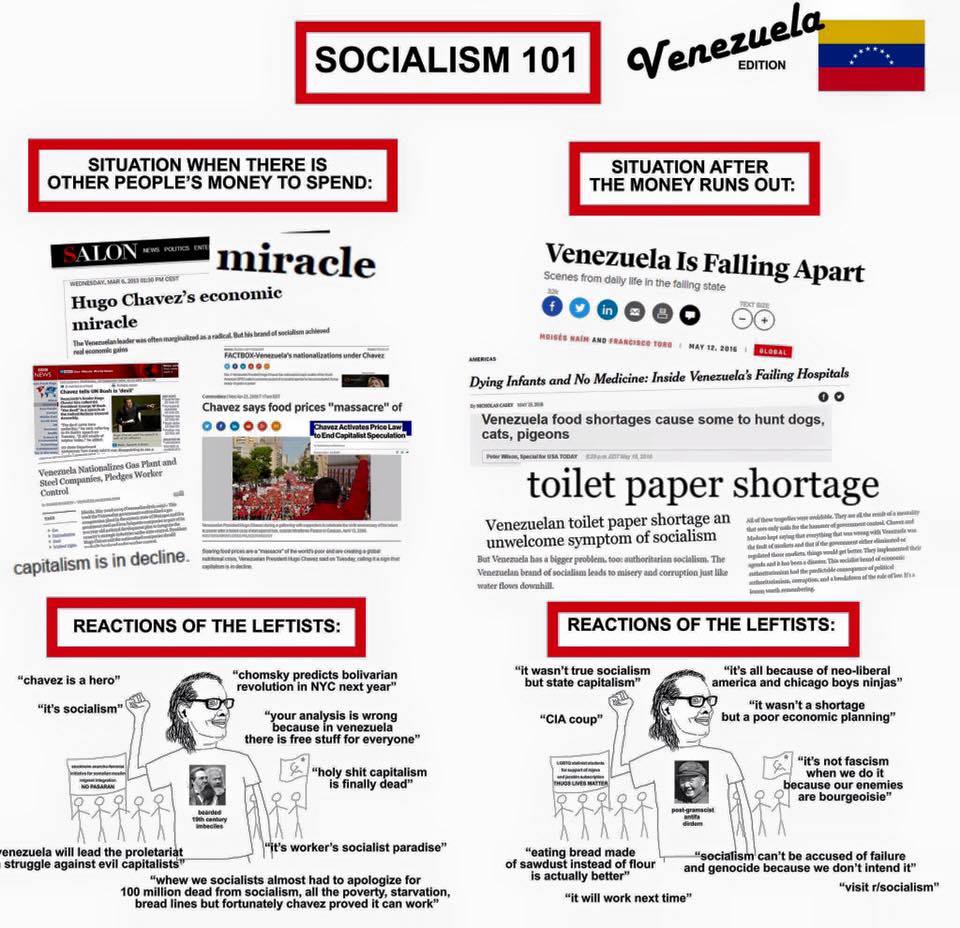Klasičan primjer zapadnog(i naših forumskih) socijalista
Page 1 of 3
Page 1 of 3 • 1, 2, 3 
 Re: Klasičan primjer zapadnog(i naših forumskih) socijalista
Re: Klasičan primjer zapadnog(i naših forumskih) socijalista
Ovo mi je jaka kada su ovi iz Venezuele objavili "rat cijenama hrane i kraj trgovačkim špekulacijama", pola foruma je slavilo kako je to super :D
naravno nas par ekonomskih pismenijih smo znali da će to dovesti do kolapsa proizvodnje hrane i ostaloga..
sada kada ovi po ulicama hvataju pase , mačke i golubove, sada je kriva CIA, neoliberalna zavjera, "nije bio pravi kapitalizam" , itd
zanimljivo je da je pun kurac zapadnih medija(mediji na zapadu su uglavnom lijevo) slavio venezuelu a sada šute čak i sakrivaju svoju sramotu :D
naravno nas par ekonomskih pismenijih smo znali da će to dovesti do kolapsa proizvodnje hrane i ostaloga..
sada kada ovi po ulicama hvataju pase , mačke i golubove, sada je kriva CIA, neoliberalna zavjera, "nije bio pravi kapitalizam" , itd
zanimljivo je da je pun kurac zapadnih medija(mediji na zapadu su uglavnom lijevo) slavio venezuelu a sada šute čak i sakrivaju svoju sramotu :D

Guest- Guest
 Re: Klasičan primjer zapadnog(i naših forumskih) socijalista
Re: Klasičan primjer zapadnog(i naših forumskih) socijalista
Socijalizam ne funkcionira jer nije zasnovan na profitu, a to uništava ekonomiju.
_________________


Regoč-

Posts : 35954
2015-08-21
Age : 105
Lokacija: : Doma
 Re: Klasičan primjer zapadnog(i naših forumskih) socijalista
Re: Klasičan primjer zapadnog(i naših forumskih) socijalista
nek rjesavaju to poput SFRJ, laznim statistikama i brisanjem nula sa novcanica,bonovima,par-nepar danima i ostalim prednostima soc realizma

Clone Stormtrooper-

Posts : 738
2016-02-19
 Re: Klasičan primjer zapadnog(i naših forumskih) socijalista
Re: Klasičan primjer zapadnog(i naših forumskih) socijalista
Oko podrske socijalizmu u venecueli bio je ovdje najgrlatiji provocator

vuksadinare- Posts : 99087
2015-09-08
 Re: Klasičan primjer zapadnog(i naših forumskih) socijalista
Re: Klasičan primjer zapadnog(i naših forumskih) socijalista
Provo je zadrti samoupravni socijalist koji smatra da je taj sustav propao zbog CIA-ine zavjere.
_________________


Regoč-

Posts : 35954
2015-08-21
Age : 105
Lokacija: : Doma
 Re: Klasičan primjer zapadnog(i naših forumskih) socijalista
Re: Klasičan primjer zapadnog(i naših forumskih) socijalista
On bi sve za djabe..a da qurtzom ne mrdneRegoč wrote:Provo je zadrti samoupravni socijalist koji smatra da je taj sustav propao zbog CIA-ine zavjere.

vuksadinare- Posts : 99087
2015-09-08
 Re: Klasičan primjer zapadnog(i naših forumskih) socijalista
Re: Klasičan primjer zapadnog(i naših forumskih) socijalista
preko_vode_do_slobode wrote:klik za punu rezoluciju
Izvuci glavu iz američkog šupka, operi oči i uši a i nos i usta od smrdljivih američkih govana pa pogledaj oko sebe i pročitaj ovo:
The Other Explanation for Venezuela’s Economic Crisis
March 24, 2016 COHA 17 Comments Chavez, chavismo, Maduro, Peter Bolton
By Peter Bolton, Research Fellow at the Council on Hemispheric Affairs
To download a PDF version of this article, click here.
Reports in the English-language press last week highlighted a series of small-scale street protests in Venezuela that bemoaned the scarcity of certain basic products, chronic shortages of medical supplies, and continued power and water outages throughout the country. According to Reuters, for instance, more than a thousand such protests occurred in January and February and, taken together, “show the depth of public anger” and “could become a catalyst for wider unrest.”[1] News accounts proclaiming Venezuela’s state of emergency are not new but in recent weeks have reached hysterical levels, with the Boston-based Global Post claiming that Venezuela’s economic situation is now “worse than 1960s Cuba.”[2]
The mainstream narrative explanation is that the crisis is the result of economic mismanagement and the ideological rigidity of the country’s “authoritarian” Chavista led-government. For instance, Andreas E. Feldmann, Federico Merke, and Oliver Stuenkel, writing for the Carnegie Endowment for International Peace, wrote last November that “Venezuela’s steep recession has been worsened by economic mismanagement leading to mounting inflation, a widening fiscal deficit, and growing shortages of essential goods including food, soap, and diapers.”[3] Similarly, Arlecchino Gomez at The Daily Signal, wrote, also last November, that Venezuela’s recession “was largely due to government incompetence and mismanagement.”[4]
The Workings of the “Free” Market
These sentiments are strongly predicated on the standard line of economic thought prevailing in the Western media and political class: that stringent price and currency controls are distorting the mechanisms of the “free” market and have led to stagnant production, soaring inflation and a burgeoning black market in U.S. dollars and consumer goods. The explicit or strongly implied conclusion is that the crisis proves beyond doubt that socialism “doesn’t work” and that the solution to Venezuela’s ills is a return with gusto to Chicago School economic policy and hence a restoration of the unimpeded mechanisms of the market. Making this point in Forbes magazine, Tim Walstall goes so far as to compare the situation in Venezuela with the collapse of the Soviet Union; he argues that the solution “is to do as Russia did at the end of their socialist nightmare… [and implement] an immediate move to full blown free marketry [sic].”[5] To achieve this, “regime change” is presented as an imperative prerequisite and the only viable way for things to improve. Michael Shifter, writing in Foreign Affairs, says that even though many on the Latin American left initially found Chavismo an “appealing alternative to market-based approaches,” these days “few dispute that it has failed.”[6]
The Alternative Thesis
Within Venezuela itself, however, this analysis is just one of two competing narratives, both of which are discussed and taken seriously in discussions of policy, governance, and economic dynamics. The economic mismanagement thesis is the natural position taken by the Venezuelan opposition and its allies. But the fact that it is practically the only narrative reported in the English-language press misrepresents the intricacies of Venezuela’s economic problems while revealing how Western media heavily favor the opposition’s analysis, often by its own admission. (Rory Carroll of The Guardian, for instance, boasted that he moved almost exclusively in opposition elite circles while based in Caracas as the paper’s Latin America editor.)
But there is another narrative, favored by the government and the pro-Chavista social movements and civil society sectors, which, it is important to stress, are independent of the government. This perspective can loosely be called the economic war thesis. It explains the crisis in terms of the economic and social dynamics at play outside policy and governmental action. It holds that business sectors friendly to the opposition are waging an aggressive and protracted campaign of economic sabotage to deliberately stir up social unrest to destabilize and discredit the governing Chavista bloc and in the ensuing chaos bring about an end to the PSUV government and the installation of a new one made up of opposition parties. The central pillars of the economic war thesis are that these hostile sectors have been engaging in acts such as hoarding and price speculation and have purposely generated scarcity in pursuit of calculated chaos.
Naturally, all of the allegations that make up this narrative are dismissed out of hand by the opposition, which argues that they amount to a desperate propaganda stunt to shift blame from the government’s own incompetence onto its political opponents. President Nicolás Maduro’s use of the term “bourgeois parasites” in particular has been seized on by opposition commentators to portray him as a hopeless buffoon desperately holding onto to power and flailingly seeking to prop up a failed political project. Friendly commentators in the Western press are equally disparaging, with the aforementioned Michael Shifter, for instance, claiming that these accusations “have no merit,” but do serve to “show that any semblance of cooperation between the executive and the assembly to alleviate the country’s economic collapse is, at least for now, far-fetched.”[7] Similarly, Jeffrey Taylor writes in Foreign Policy, “Maduro’s response [to shortages and currency crises] has been to blame everything on scheming “Yanquis,” Venezuela’s “far-right elite,” the “parasitic bourgeois,” and, of course, the opposition, “even though he has effectively neutralized its leadership.”[8]
But though more scholarly research is necessary for a detailed and considered analysis of the myriad factors contributing to Venezuela’s economic situation, it is worth giving the claims of Chavismo a fair hearing. A fuller picture shows that this alternate thesis should not be so glibly dismissed.
Take hoarding, for instance. Before Hugo Chávez was elected president in 1998, the economic levers of society were near-exclusively in the hands of a social elite of overwhelmingly light-skinned Venezuelans: the inhabitants of the wealthy neighborhoods of Venezuela’s urban centers and wealthy landowners of the campo. Not only were they in charge of importation, distribution and wholesaling of all manner of goods for the Venezuelan markets, but they also had a stranglehold over the state apparatus needed to profiteer from effective importation in the first place. A central goal of Chavismo was to wrest control of the economic levers from this elite and more evenly disperse it throughout society. The Chávez and Maduro administrations have sought to democratize economic decision-making and predicate it on serving the public interest rather than the pursuit of private profit.
Confronting Entrenched Privilege
Political psychology provides important insights into the socio-economic dynamics of Venezuelan society. In his book, Angry White Men, sociologist Michael Kimmel argues that much of white men’s rage in the United States is the result of privileges that were historically bestowed on them gradually becoming less automatic. As historically disadvantaged sectors gain more opportunities and influence, the change appears to the previously favored group as a great injustice.[9] The same dynamic is evident in Venezuela: an unaccountable elite of overwhelmingly white, Euro-descent Venezuelans hold positions of influence and has had control of many of the important economic decisions. In great part the Chavista movement was based on giving voice to the country’s poor majority, which incidentally is overwhelmingly black, brown, indigenous, and/or mixed race. Hugo Chávez was himself of mixed-race heritage, with European, native Venezuelan, and African ancestry. The mere idea that such a person (or mono, meaning monkey, as the opposition frequently called him) could be president and give voice to the dark-skinned chusma was seen as a veritable insult to the Venezuelan elite.
The Chávez and Maduro governments have attempted to transition Venezuela away from a society that has been not only inherently racist and classist, but also highly rigid, stratified and oligarchic. Problems inevitably arise because this elite already holds the reins and can aggressively resist a recalibration of economic and social power. In 1998, the highly corrupt business class controlled almost every economic structure imaginable from distribution of food and production of oil to systems for obtaining dollars and importing consumer goods. As James Petras and Henry Veitmeyer argue in their 2013 book What’s Left in Latin America? Regime Change in New Times, “The government’s socialist project depends on mass social organizations capable of advancing on the economic elite and cleaning the neighborhoods of rightwing thugs, gangsters and paramilitary agents of the Venezuelan oligarchs and [Colombia’s] Uribe regime.”[10] Since these are the people who were already in positions of economic power and influence when the Bolivarian process began, their ability to throw a wrench in the government’s efforts for reform has been formidable. Ryan Mallet-Outtrim, writing in Venezuela Analysis, points out that “Venezuela’s private sector has long attacked the socialist government.” So much so, he adds, “that for years Venezuelans have acknowledged that scarcity of basic consumer goods spikes around important elections, as businesses seek to pressure voters into turning against Chavismo.”[11]
Evidence of such efforts by pro-opposition sectors has not been lacking. Immediately following the opposition victory in the 2015 National Assembly elections, for instance, social media commentators indicated that staple goods miraculously began to reappear on shelves throughout the country.[12] Tellingly, some of the products had expiration dates that suggested that the problem was not with production but rather with distribution, which is largely controlled by the right-wing business elite. By creating this kind of scarcity, the elite were essentially trying to starve the public into rejecting the revolution, a tactic influenced by the United States’ economic blockade against Cuba.
When these dynamics are taken in the wider context of Venezuelan politics over the last two decades, they begin to seem less and less ridiculous and more and more plausible. Throughout the period of Chavismo there have been times when these aggressive tactics of economic sabotage have been too obvious to allow for the opposition’s usual equivocation. During the so-called oil strike, for example, opposition forces led by Venezuela’s largest business association, Fedecamaras, orchestrated a nationwide disruption of oil production in hopes that the ensuing economic chaos would destabilize the government and precipitate a coup.[13] Taken in the context of this history of instigated pandemonium, the economic war thesis emerges as at least equally worthy of consideration as its major competitor.
Internal and External Challenges to the Revolution
None of this is to say, of course, that there are no legitimate criticisms of the central government, far less that the opposition’s explanation for the economic crisis should be dismissed as casually as it dismisses the government’s. Yet there are mitigating factors that must be raised in the government’s defense. The Bolivarian process has attempted not just to pay the social debt that was owed the country’s poor majority, but also to radically transform society by offering an alterative development model to the neoliberal consensus of the 1980s and 1990s that plunged the entire region into disarray. The Chávez and Maduro administrations have attempted this task while facing constant hostility not only from an aggressive internal political opposition that has often resorted to violence, but also from the hemisphere’s hegemon, the United States. Washington, which almost instinctively has been opposed to Chavismo from day one, has consistently interfered in Venezuela’s internal affairs in the hope of crushing the Bolivarian process. From a Bush administration-backed[14] and CIA-aided[15] coup in 2002, in which then-President Chavez was nearly removed from power by force, to refusals to recognize Chavista electoral victories, threats of sanctions, and covert funding for opposition candidates, the United States had been determined to do everything possible to ensure that it would fail. The United States has viciously opposed anything that threatens the dominance of the unfettered neoliberal capitalist vision that it has sought to defend, and then spread, throughout the world. As William Camacaro and COHA Senior Research Fellow Fred Mills wrote early last year in Counterpunch, “A great deal hangs in the balance with regard to the feasibility of advancing a democratic socialist project while under the continuous attack of a U.S.-backed opposition, elements of which are bent on restoring the neoliberal regime.”[16]
http://www.coha.org/the-other-explanation-for-venezuelas-economic-crisis-2/

Guest- Guest
 Re: Klasičan primjer zapadnog(i naših forumskih) socijalista
Re: Klasičan primjer zapadnog(i naših forumskih) socijalista
Regoč wrote:Provo je zadrti samoupravni socijalist koji smatra da je taj sustav propao zbog CIA-ine zavjere.
Ameri nisu htjeli njihovu robu i to ti je to. Venezuela je dobra za običan puk koji nema velikih prohtjeva. :D Drugovi na vlasti se časte, a narod neka steže remen.

Guest- Guest
 Re: Klasičan primjer zapadnog(i naših forumskih) socijalista
Re: Klasičan primjer zapadnog(i naših forumskih) socijalista
bilo je par još drugih forumaša, provocator je bio i ostao, takve još i cijenimvuksadinare wrote:Oko podrske socijalizmu u venecueli bio je ovdje najgrlatiji provocator

Guest- Guest
 Re: Klasičan primjer zapadnog(i naših forumskih) socijalista
Re: Klasičan primjer zapadnog(i naših forumskih) socijalista
kofein wrote:Regoč wrote:Provo je zadrti samoupravni socijalist koji smatra da je taj sustav propao zbog CIA-ine zavjere.
Ameri nisu htjeli njihovu robu i to ti je to. Venezuela je dobra za običan puk koji nema velikih prohtjeva. :D Drugovi na vlasti se časte, a narod neka steže remen.
The same dynamic is evident in Venezuela: an unaccountable elite of overwhelmingly white, Euro-descent Venezuelans hold positions of influence and has had control of many of the important economic decisions.
In great part the Chavista movement was based on giving voice to the country’s poor majority, which incidentally is overwhelmingly black, brown, indigenous, and/or mixed race. Hugo Chávez was himself of mixed-race heritage, with European, native Venezuelan, and African ancestry. The mere idea that such a person (or mono, meaning monkey, as the opposition frequently called him) could be president and give voice to the dark-skinned chusma was seen as a veritable insult to the Venezuelan elite.
The Chávez and Maduro governments have attempted to transition Venezuela away from a society that has been not only inherently racist and classist, but also highly rigid, stratified and oligarchic. Problems inevitably arise because this elite already holds the reins and can aggressively resist a recalibration of economic and social power. In 1998, the highly corrupt business class controlled almost every economic structure imaginable from distribution of food and production of oil to systems for obtaining dollars and importing consumer goods. As James Petras and Henry Veitmeyer argue in their 2013 book What’s Left in Latin America? Regime Change in New Times, “The government’s socialist project depends on mass social organizations capable of advancing on the economic elite and cleaning the neighborhoods of rightwing thugs, gangsters and paramilitary agents of the Venezuelan oligarchs and [Colombia’s] Uribe regime.”[10] Since these are the people who were already in positions of economic power and influence when the Bolivarian process began, their ability to throw a wrench in the government’s efforts for reform has been formidable. Ryan Mallet-Outtrim, writing in Venezuela Analysis, points out that “Venezuela’s private sector has long attacked the socialist government.” So much so, he adds, “that for years Venezuelans have acknowledged that scarcity of basic consumer goods spikes around important elections, as businesses seek to pressure voters into turning against Chavismo.”[11]

Guest- Guest
 Re: Klasičan primjer zapadnog(i naših forumskih) socijalista
Re: Klasičan primjer zapadnog(i naših forumskih) socijalista
neki ljudi rade, i više od 1 posla, itd,.. možeš li u par rečenica napisati sažetak,

Guest- Guest
 Re: Klasičan primjer zapadnog(i naših forumskih) socijalista
Re: Klasičan primjer zapadnog(i naših forumskih) socijalista
Treba naoružat demokratske pobunjenike.

RayMabus- Posts : 175869
2014-04-11
 Re: Klasičan primjer zapadnog(i naših forumskih) socijalista
Re: Klasičan primjer zapadnog(i naših forumskih) socijalista
Samo jedna stvar je potrebna da bi socijalizam zaživio. Samo jedna. Ali, nemojte me pitati koja. Čovječanstvo nije spremno za to. Zato će se dogoditi ono što više nije puka teorija zavjere. Dok ste se smijali svemu tome, jedan neupitan proces transformacije ljudskog društva u okvirima ovog sustava u kojem živite je išao svojim tokom. Sad slijedi finalizacija.

red wolf-

Posts : 15940
2016-02-10
Lokacija: : Svemir
 Re: Klasičan primjer zapadnog(i naših forumskih) socijalista
Re: Klasičan primjer zapadnog(i naših forumskih) socijalista
Regoč wrote:Socijalizam ne funkcionira jer nije zasnovan na profitu, a to uništava ekonomiju.
Stvar je da ni kapitalizam ne funkcionira bez državne intervencije.
Pa je sad pitanje, da li propasti zbog ideoloških uvjerenja, ili pregaziti principe i prihvatiti budućnost s većim javnim sektorom i većim deficitom.

Guest- Guest
 Re: Klasičan primjer zapadnog(i naših forumskih) socijalista
Re: Klasičan primjer zapadnog(i naših forumskih) socijalista
Samo jednu stvar morate napraviti. Samo jednu.deda getting old wrote:Regoč wrote:Socijalizam ne funkcionira jer nije zasnovan na profitu, a to uništava ekonomiju.
Stvar je da ni kapitalizam ne funkcionira bez državne intervencije.
Pa je sad pitanje, da li propasti zbog ideoloških uvjerenja, ili pregaziti principe i prihvatiti budućnost s većim javnim sektorom i većim deficitom.


red wolf-

Posts : 15940
2016-02-10
Lokacija: : Svemir
 Re: Klasičan primjer zapadnog(i naših forumskih) socijalista
Re: Klasičan primjer zapadnog(i naših forumskih) socijalista
preko_vode_do_slobode wrote:neki ljudi rade, i više od 1 posla, itd,.. možeš li u par rečenica napisati sažetak,
Da, stvarno. U iebate, pa koliko im traje radni dan .......biće 72 h.

Yehudi- Posts : 14715
2014-04-20
 Re: Klasičan primjer zapadnog(i naših forumskih) socijalista
Re: Klasičan primjer zapadnog(i naših forumskih) socijalista
kaki je to socijalizam, a na ingliški?..ništa to..preko_vode_do_slobode wrote:klik za punu rezoluciju


frakcija- Posts : 5635
2016-03-09
 Re: Klasičan primjer zapadnog(i naših forumskih) socijalista
Re: Klasičan primjer zapadnog(i naših forumskih) socijalista
Ne treba nam socijalizam.
Kaoitalizam je divan poredak .
Rasponi bogatstva i siromastva su takvi da milijarderi mogu kupiti pola od ukupnog broja Zemljana .
Znaci bogatasi od oko 50 milijardi dolara na nize semogu usporediti s dohotkom 4 milijarde stanovnika Zemlje .
U kapitslizmu se siromasnima u vecini drzavasvjeta ne omogucava distojanstven zivot a kspitalisticko izrabljivanje radnistva vodi u drustvene patologije . Od nstkomanije do prodaje vlastitig organa .
Kako je drzava u kapitalizmu samo paravsn za klasu na vlasti , lazna demokracija funkcionira isto kao vrsta religije . Svi u nju vjeruju a imaju kurca od nje.
Kapitslizam je sustav u kojem je dobro. Bogatima. Vi siromasni pusite ak imate kaj .
Lijep sustav .. Vidi se i kod nas .
Kaoitalizam je divan poredak .
Rasponi bogatstva i siromastva su takvi da milijarderi mogu kupiti pola od ukupnog broja Zemljana .
Znaci bogatasi od oko 50 milijardi dolara na nize semogu usporediti s dohotkom 4 milijarde stanovnika Zemlje .
U kapitslizmu se siromasnima u vecini drzavasvjeta ne omogucava distojanstven zivot a kspitalisticko izrabljivanje radnistva vodi u drustvene patologije . Od nstkomanije do prodaje vlastitig organa .
Kako je drzava u kapitalizmu samo paravsn za klasu na vlasti , lazna demokracija funkcionira isto kao vrsta religije . Svi u nju vjeruju a imaju kurca od nje.
Kapitslizam je sustav u kojem je dobro. Bogatima. Vi siromasni pusite ak imate kaj .
Lijep sustav .. Vidi se i kod nas .
_________________
DUM SPIRO, SPERO

Sora- Posts : 23713
2014-04-29
Page 1 of 3 • 1, 2, 3 
 Similar topics
Similar topics» POBUNA ZENA FORUMSKIH...
» Pokret socijalista pokrenuo peticiju za osudu američkih sankcija Vulinu
» marčeljušov idol ,,ustaški socijalista
» Test inteligencije forumskih korisnika
» cilj Danijela Bezuka je bila RASA SOCIJALISTA
» Pokret socijalista pokrenuo peticiju za osudu američkih sankcija Vulinu
» marčeljušov idol ,,ustaški socijalista
» Test inteligencije forumskih korisnika
» cilj Danijela Bezuka je bila RASA SOCIJALISTA
Page 1 of 3
Permissions in this forum:
You cannot reply to topics in this forum
 Events
Events Latest images
Latest images
 by Guest 10/6/2016, 16:42
by Guest 10/6/2016, 16:42

